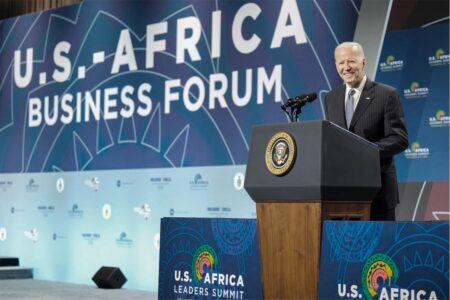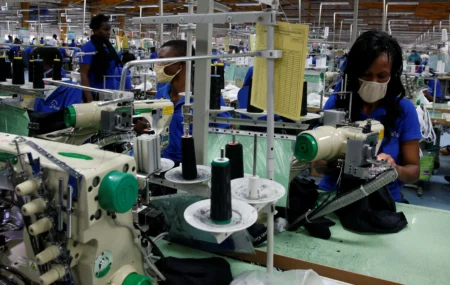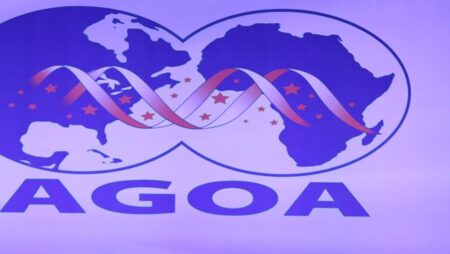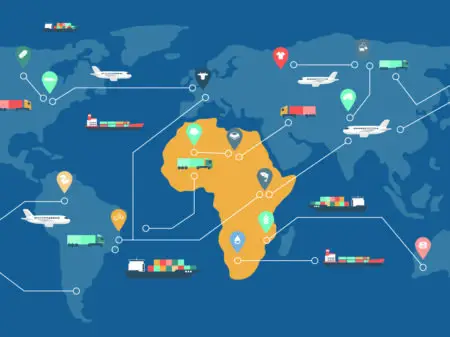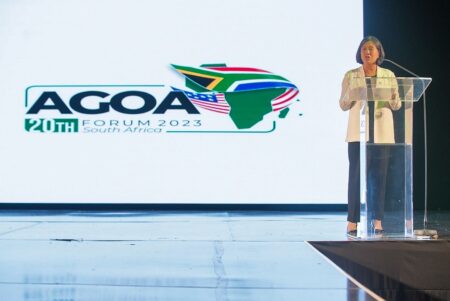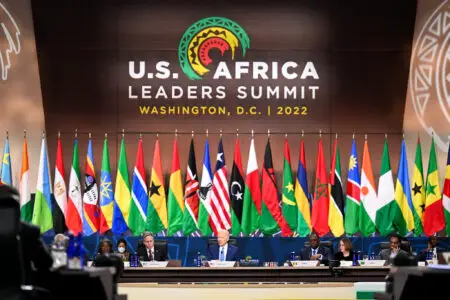- Africa’s new dawn: the rising role of digital and AI in agriculture
- Can Dangote Refinery Transform Africa Energy Ambition
- Gallup Survey: 80 per cent of Kenyan Workers Are Disengaged and Seek New Opportunities
- Madagascar Man Freed from 5KG Tumor After 15-Year Struggle
- How women in Africa are perceived and treated
- Sugar consumption in Kenya to Increase to 1.23 Million Tonnes
- Can Somalia and Turkey Oil deal Bring Change in Somaliland
- Remittances to Kenya dropped to $371.6 million in June, marking a six month low
Browsing: Agoa
- The proposed AGOA extension signals a commitment to bolstering trade relations between the US and Africa.
- US Senators Chris Coons and James Risch have introduced the bipartisan Agoa Renewal and Improvement Act of 2024, aiming to integrate AGOA with the AfCFTA.
- Bill aims to refine AGOA’s eligibility criteria, increase transparency, and hold US agencies accountable for their advice to the president: Senator Risch
AGOA extension proposal
The US Congress has proposed extending the African Growth and Opportunity Act (Agoa) to 2041, covering all 54 African countries. Senators Chris Coons of Delaware and James Risch of Idaho introduced the bipartisan Agoa Renewal and Improvement Act of 2024, aiming to integrate Agoa with the African Continental Free Trade Agreement (AfCFTA) to foster intra-African supply chains.
Originally enacted in 2000, Agoa is set to expire next year. However, the proposed extension signals a commitment to bolstering trade relations between the United States and …
- High protection and heavy import dependency have left industries in Africa poorly prepared for international competition.
- The tendency of many African governments to assign a leading role to the state in creating and operating manufacturing firms makes industries in Africa hard to thrive.
- For decades, investments by African governments are often made with little regard to efficiency and the managerial capacity in target industries.
Africa Industrialization Day on November 20 is here, yet the region’s skies remain smokeless. While the region is endowed with $82 trillion worth of discovered natural resources, with the potential to contribute $30 billion a year in government revenue over the next 20 years, this potential remains untapped.
Africa’s failed industrialization
Sadly, Africa’s industrialization has been failing if not stagnating as many nations continue turning into customers of established manufacturing zones in China, Europe and India. For instance, Africa exports around 69 per cent of the …
United States officials and politicians have shown much interest and support for renewing the African Growth and Opportunity Act (AGOA) as its expiration date approaches in September 2025. The fate of this landmark legislation, which provides duty-free access to the US markets for some African countries, remains uncertain for the next 22 months but has significant implications for trade between the United States and Africa.…
- Africa Rising narrative paints a picture of a continent on the cusp of a major economic and developmental breakthrough.
- This upbeat assessment, however, stands in stark contrast to the realities of many African countries’ political instability, corruption, and threats from autocratic regimes.
- This disharmony between the narrative’s upbeat tone and the facts prompts the question: is there a need for the widespread optimism about Africa’s future, or is it misplaced?
The “Africa Rising” narrative, popularised in recent years, paints a picture of a continent on the cusp of a major economic and developmental breakthrough. This upbeat assessment, however, stands in stark contrast to the realities of many African countries’ political instability, ongoing corruption, and threats from autocratic regimes. The premature or even misplaced optimism of this narrative is called into question by a close analysis of these problems. This discrepancy between the narrative’s upbeat tone and the facts prompts the …
The African Growth and Opportunity Act (AGOA) has played a pivotal role in the economic relations between the US and Africa. Since its enactment by the US Congress in 2000, Agoa has offered African nations preferential access to American markets, promoting trade and economic growth. In recent years, however, AGOA has become a focal point in the intensifying competition between the US and China for influence in Africa.…
Four African countries are staring at huge losses running into billions of dollars starting January 2024 following their expulsion from the African Growth and Opportunity Act (AGOA). The move will further worsen the unemployment crisis in the affected countries. Agoa offers thousands of jobs in apparels industry, especially to the youth.…
Until the Biden Administration, US-Africa trade relations had remained remarkably consistent. Africa Growth and Opportunities Act (AGOA), in place since October 2000 through five separate US administrations, has been the ‘centrepiece’ of this consistency.…
In recent years, Africa has emerged as a promising destination for global investment, with its vast natural resources, expanding consumer markets, and growing middle class. As the continent’s economies continue to strengthen and diversify, global players increasingly recognise the potential for mutually beneficial partnerships. The United States has significantly contributed to Africa’s economic transformation among these partners.…
- Ongoing wars in Africa are bleeding billions from poor economies as investors flee the region.
- Sudan army is spending about $1.5 million per day fighting the Rapid Support Forces.
- IMF says Ethiopia’s GDP contracted from 9 percent in 2019 to 6.1 percent in 2020 as Tigray war intensified.
Wars in Africa are costing an arm and a leg, and throwing an awful wrench on poor economies that are hardly providing the bare minimum to their citizens. Take for instance the latest ongoing war in Sudan. Sudan Tribune notes that it is costing roughly $1.5 million every day for the Sudanese army to fight the Rapid Support Forces (RSF).
For Sudan, a country whose poverty rate rose from 64.6 percent in 2021 to 66.1 percent last year, $1.5 million is a huge sum of money to be wasted on senseless fighting.
Wars in Africa yielding economic crisis
Sudan is one of …
- Governor Patrick Njoroge has written to Janet Yellen seeking audience with her during this year’s Spring Meetings of the World Bank Group (WBG) and the International Monetary Fund (IMF).
- The meetings are set to take place in Washington DC from April 10 –16.
- In January, the World Bank revised downwards Kenya’s growth projection for 2023 to five per cent from 5.2 per cent.
The Central Bank of Kenya (CBK) governor is keen to meet the US Secretary of the Treasury, as the East African country navigates through tough economic times occasioned by both global and domestic factors.
Governor Patrick Njoroge has written to Janet Yellen seeking audience with her during this year’s Spring Meetings of the World Bank Group (WBG) and the International Monetary Fund (IMF), set to take place in Washington DC from April 10 –16.
This is after failing to meet Yellen last October.
“I would greatly appreciate …





